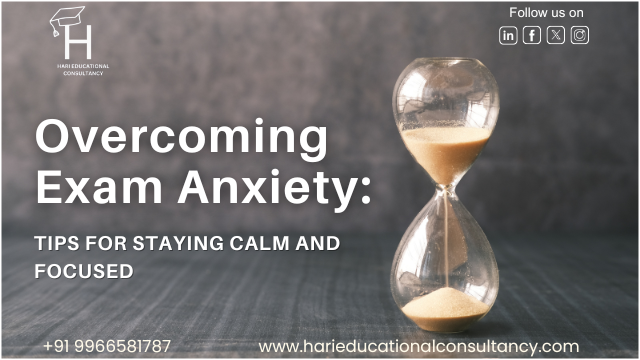Exams can be stressful, but overcoming exam anxiety effectively can make a huge difference in performance. Many students experience nervousness before exams, but excessive anxiety can hinder concentration and retention. Here are some practical tips to stay calm and focused during exams.
1. Prepare Thoroughly
One of the main reasons for exam anxiety is inadequate preparation. Create a structured study plan, start early, and break down subjects into manageable sections. Regular revisions and practice tests can help boost confidence and reduce uncertainty.
2. Practice Mindfulness and Relaxation Techniques
Deep breathing exercises, meditation, and progressive muscle relaxation can help calm your mind. Try the 4-7-8 breathing technique: inhale for four seconds, hold for seven, and exhale for eight. This simple exercise can reduce anxiety almost instantly.
3. Get Enough Sleep
Lack of sleep can increase stress levels and impair cognitive function, making overcoming exam anxiety harder. Aim for 7-9 hours of sleep, especially the night before an exam, to ensure better focus and memory retention.
4. Maintain a Healthy Diet
Eating a balanced diet rich in brain-boosting foods like nuts, fruits, vegetables, and whole grains can improve concentration and energy levels, aiding in overcoming exam anxiety. Avoid excessive caffeine and sugary snacks, as they can lead to energy crashes and heightened anxiety.
5. Stay Physically Active
Exercise releases endorphins, which act as natural stress relievers and help in overcoming exam anxiety. Even a short walk, yoga, or stretching exercises can help you feel more relaxed and focused before an exam.
6. Use Positive Affirmations
Replace negative thoughts with positive affirmations like, “I am prepared and capable,” or “I can do this.” Maintaining a positive mindset can significantly help in overcoming exam anxiety.
7. Take Breaks While Studying
Overloading your brain with information without breaks can lead to burnout. Use the Pomodoro technique—study for 25 minutes, then take a 5-minute break—to maintain productivity and focus.
8. Practice Mock Tests in Exam-Like Conditions
Simulating exam conditions while practicing can help reduce fear and anxiety. It makes you more comfortable with time management and question patterns.
9. Arrive Early on Exam Day
Rushing to the exam hall at the last minute can increase anxiety. Plan ahead, reach early, and settle down to ease your nerves.
10. Avoid Last-Minute Cramming
Cramming can increase stress and confusion. Instead, review key points, summaries, or mind maps to reinforce knowledge without overwhelming yourself.
Final Thoughts
Overcoming exam anxiety is common, but with the right strategies, you can stay calm, focused, and confident. Prioritize preparation, maintain a healthy routine, and practice relaxation techniques to perform at your best. Remember, exams are just a part of your learning journey—stay positive and give it your best shot!
For expert career guidance and academic support, reach out to Hari Educational Consultancy (HEC). We’re here to help you achieve your educational goals!
Contact Us
📞 Phone: +91 9966581787
🌐 Website: www.harieducationalconsultancy.com

